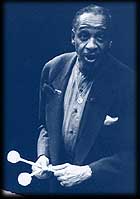
|
|
|
|
|
|
credit: Tim Owens |
Milt Jackson Few musicians have achieved as great a level of individualism on their instrument as vibraphone master Milt Jackson. On this swinging edition of Billy Taylor's Jazz at the Kennedy Center we experience Jackson's musical mastery, along with delightful conversation between two contemporaries. As Dr. Taylor exclaims on more than one occasion, "we're doing a lot of playing tonight...because I want to play with Milt Jackson." Among their rich musical interchanges are versions of "There Is No Greater Love", the bebop classic "Woody 'N You" by Dizzy Gillespie, Duke Ellington's "In a Sentimental Mood," Billy's former radio theme song "A Bientot," the Frank Foster classic for the Count Basie Orchestra, "Shiny Stockings," and two of Jackson's originals, "Bags Groove" and "Spirit Feel." The vibraphone is an instrument with few accomplished practitioners; but there is no more important musician in this lineage than Milt Jackson. His sound is inimitable, opulent and shimmering, bluesy and supremely swinging. A native of Detroit, Milt Jackson's musical odyssey actually began on the guitar. As a teenage gospel guitarist, he sang and performed duets with his brother on several gospel tours. That keen sense of gospel music clearly informs the music of Milt Jackson, while deepening his sense of the blues. At one point in the program Billy asks him about his seemingly lifelong blues investment. Milt responds quite simply, saying "you have no jazz music without the blues." Dr. Taylor notes that Detroit was a crucible of jazz and a center for many important musicians. Jackson's hometown clearly played an indelible role in his development; it was there that bandleader Dizzy Gillespie picked young Milt to join his band. When Billy asks Milt about his early days with Dizzy, Jackson recalls his first gig at the Brown Derby in Washington, DC. He elicits laughter from the audience when he recalls that the venue lacked a dressing room, save for a closet with a grocery bag for a curtain. The humorous Mr. Jackson breaks up the audience again when Billy asks him about doubling on vibes and piano in Dizzy's band. As a result of this double duty, Jackson confronted Gillespie one day and requested a raise, whereupon Dizzy suggested that maybe he'd better get his own band. As Jackson tells the audience, "I did!" Milt's first ensemble after leaving the Gillespie band was the Milt Jackson Quartet; the initials MJQ were prophetic. MJQ later came to stand for the unique cooperative unit called the Modern Jazz Quartet which succeeded this first group. With great pride, Jackson informs the audience that the MJQ set a longevity record for jazz bands: "[we had] the same personnel 41 of our 43 years!" As Billy and Milt discuss, the MJQ was also the product of the musical direction of two musicians with distinctly different outlooks: the classical sensibilities of its pianist, John Lewis, blended with Jackson's keen sense of the blues. The show's customary audience question segment yields insights about "the differences between ‘bebop’ and ‘straight ahead’ jazz..." Billy suggests that these terms are simply labels applied by people who don't actually play the music. Later, Milt recalls the unique kinship he had with bluesmaster Ray Charles on a famous record date. At one point, a grateful audience member surprises all by thanking Milt for the fact that his parents met at an MJQ performance. The enthusiastic response of this audience indicates that the music of Jackson and the Billy Taylor Trio is bringing people together on this night as well. Don't miss Milt Jackson in our Photo Gallery!
|
|
| |

